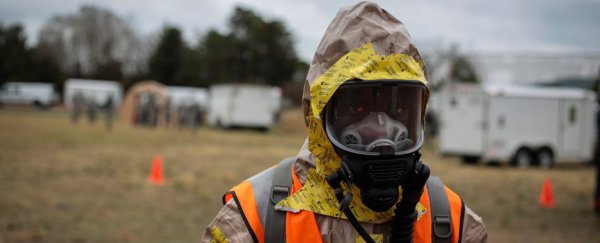In an ongoing bungle that is attracting savage criticism of its handling of biological threats, the Pentagon has acknowledged that it accidentally shipped live anthrax samples to almost 200 laboratories across the globe.
In new figures shared by the US Department of Defence, the Pentagon has updated its account of how widespread an anthrax scare in May really was, now disclosing that live samples of anthrax were sent to 192 labs across the US and seven other countries, including Japan, the United Kingdom, Korea, Australia, Canada, Italy, and Germany.
The US Department of Defence first revealed the debacle in May, but at the time claimed that the mistaken deliveries were limited to just 10 labs in total: nine in the US and one in a US military base in South Korea. The Pentagon has since updated the figures on more than one occasion, but the latest information reveals that the breach was dramatically worse than first thought, affecting nearly 20 times as many labs as the Pentagon originally claimed.
Like many other scientific bodies, the US Department of Defence regularly ships biological samples between laboratories for the purposes of testing and research, but anything as dangerous as Bacillus anthracis, the bacteria that comprises anthrax, is supposed to be deactivated so as to pose no health risks. An internal investigation into how the live spores got out this time was inconclusive but noted deficiencies in the laboratory handling of samples that could have contributed:
[T]he committee found inherent deficiencies in protocols for three phases in the production of inactive spores that could lead to non-sterile products: 1) radiation dosing, 2) viability testing, and 3) aseptic operations (contamination prevention). These deficiencies and other factors contributed to the establishment of protocols that do not completely or permanently sterilise these samples.
Whatever the exact cause was we may never know, but 21 personnel are now being monitored for exposure to the samples, although fortunately no infections have yet been reported. According to the Pentagon, due to the extremely small amounts of live spores in the samples, there was never any risk to the public, although this reassurance might not provide sufficient comfort to many.
"It's like déjà vu all over again," said Representative Tim Murphy of Pennsylvania, chair of the investigation subcommittee hearing of the House Energy and Commerce Committee, in a statement. "[D]espite the growing number of red flags, these incidents keep happening… what we have here is a pattern of recurring issues, of complacency, and a lax culture of safety."
